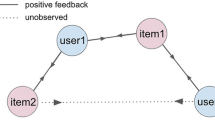Abstract
Most item recommendation systems nowadays are implemented by applying machine learning algorithms with user surveys as ground truth. In order to get satisfactory results from machine learning, massive amounts of user surveys are required. But in reality obtaining a large number of user surveys is not easy. Additionally, in many cases the opinions are subjective and personal. Hence user surveys cannot tell all the aspects of the truth. However, in this paper, we try to generate ground truth automatically instead of doing user surveys. To prove that our approach is useful, we build our experiment using Flickr to recommend tags that can represent the users’ interested topics. First, when we build training and testing models by user surveys, we note that the extracted tags are inclined to be too ordinary to be recommended as “Flickr-aware” terms that are more photographic or Flickr-friendly. To capture real representative tags for users, we apply LSA in a novel way to build ground truth for our training model. In order to verify our scheme, we define Flickr-aware terms to measure the extracted representative tags. Our experiments show that our proposed scheme with the automatically generated ground truth and measurements visibly improve the recommendation results.
This work (No. 2011-0029729) was supported by Mid-career Researcher Program through NRF grant funded by the MEST.
Access this chapter
Tax calculation will be finalised at checkout
Purchases are for personal use only
Preview
Unable to display preview. Download preview PDF.
Similar content being viewed by others
References
Sen, S., Vig, J., Riedl, J.: Learning to Recognize Valuable Tags. In: Proceedings of International Conference on Intelligent User Interfaces. ACM Press, Florida (2009)
Celik, I., Abel, F., Houben, G.: Learning Semantic Relationships Between Entities in Twitter. In: In Proceedings of the 11th International Conference on Web Engineering, Cyprus, pp. 167–181 (2011)
Chen, X., Shin, H.: Extracting Representative Tags for Flickr Users. In: In Proceedings of the 10th IEEE International Conference on Data Mining Workshops, pp. 312–317. IEEE Press, Sydney (2010)
Shin, H., Xu, Z., Kim, E.: Discovering and Browsing of Power Users by Social Relationship Analysis in Large-scale Online Communities. In: Proceedings of 8th IEEE/WIC/ACM International Conference on Intelligent Agent Technology, pp. 105–111. IEEE Press, Sydney (2008)
Das, M., Das, G., Hristidis, V.: Leveraging Collaborative Tagging for Web Item Design. In: Proceedings ofthe 17th ACM SIGKDD International Conference on Knowledge Discovery and Data Mining, pp. 538–546. ACM Press, San Diego (2011)
Lu, Y., Yu, S., Chang, T., Hsu, Y.: A Content-based Method to Enhance Tag Recommendation. In: Proceedings of the 21st International Joint Conference on Artificial Intelligence, Pasadena, pp. 2064–2069 (2009)
Song, Y., Qiu, B., Farooq, U.: Hierarchical Tag Visualization and Application for TagRecommendations. In: Proceedings ofthe 20th ACM International Conference on Information and Knowledge Management, pp. 1331–1340. ACM Press, Glasgow (2011)
Landauer, T., Foltz, P., Laham, D.: Introduction to Latent Semantic Analysis. Discourse 25, 259–284 (1998)
Phan, N., Hoang, V., Shin, H.: Adaptive Combination of Tag and Link-based User Similarity in Flickr. In: Proceedings ofthe 10th International Conference on Multimedia, pp. 675–678. ACM Press, Firenze (2010)
Shin, H., Lee, J., Hwang, K.: Separating the Reputation and the Sociability of Online Community Users. In: Proceedings of 25th Symposium on Applied Computing, pp. 1807–1814. ACM Press, Lausanne (2010)
Singular value decomposition website, http://en.wikipedia.org/wiki/Singular_value_decomposition
Author information
Authors and Affiliations
Editor information
Editors and Affiliations
Rights and permissions
Copyright information
© 2012 Springer-Verlag Berlin Heidelberg
About this paper
Cite this paper
Chen, X., Shin, H., Lee, M. (2012). LSA as Ground Truth for Recommending “Flickr-Aware” Representative Tags. In: Yu, H., Yu, G., Hsu, W., Moon, YS., Unland, R., Yoo, J. (eds) Database Systems for Advanced Applications. DASFAA 2012. Lecture Notes in Computer Science, vol 7240. Springer, Berlin, Heidelberg. https://doi.org/10.1007/978-3-642-29023-7_16
Download citation
DOI: https://doi.org/10.1007/978-3-642-29023-7_16
Publisher Name: Springer, Berlin, Heidelberg
Print ISBN: 978-3-642-29022-0
Online ISBN: 978-3-642-29023-7
eBook Packages: Computer ScienceComputer Science (R0)




